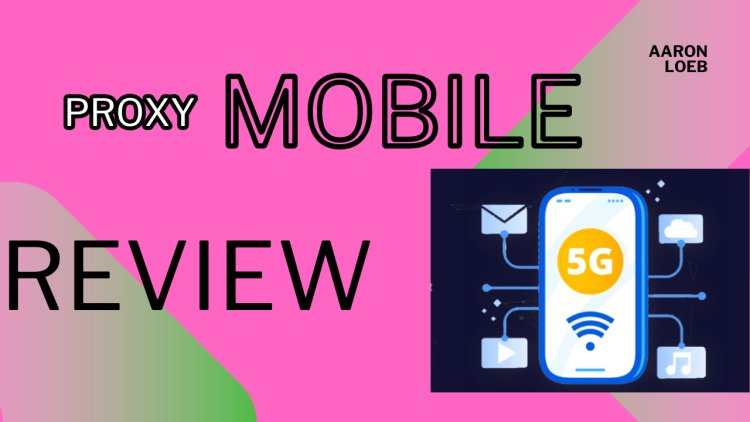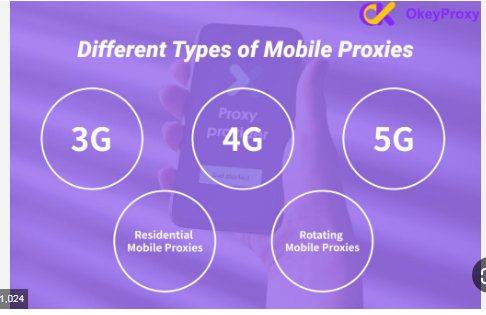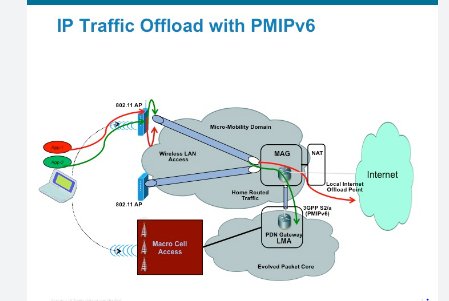Mobile Proxy: The Ultimate Guide to Understanding and Using Mobile Proxies

Introduction to Mobile Proxies
In today’s digitally-driven world, privacy, security, and access are paramount. Mobile proxies have emerged as a crucial tool for individuals and businesses looking to maintain anonymity, bypass restrictions, and gather data without revealing their true identity. But what exactly is a mobile proxy, and why has it become such an essential component in the internet toolkit?
A mobile proxy is essentially an intermediary that uses an IP address provided by mobile carriers, typically associated with mobile devices such as smartphones or tablets. These proxies route your internet traffic through a mobile network, masking your real IP address and making it appear as if you are accessing the internet from a mobile device. This gives you the ability to emulate real mobile user activity, which is invaluable for a variety of applications, from social media management to competitive intelligence.
Why Mobile Proxies are Essential
Bypassing Geo-Restrictions
One of the primary reasons people turn to mobile proxies is to bypass geo-restrictions. Whether you’re trying to access content that’s restricted to certain countries or you need to test localized versions of websites, mobile proxies allow you to change your apparent location effortlessly. This is particularly useful for businesses operating in global markets or for users trying to access streaming services unavailable in their region.
Avoiding IP Bans and Captchas
Frequent users of data center or residential proxies might find themselves blocked by websites that detect and block these types of proxies. Mobile proxies, however, benefit from the natural rotation of IP addresses through mobile networks, reducing the likelihood of bans or the triggering of CAPTCHAs. This makes mobile proxies a preferred choice for tasks that require repeated access to specific websites, such as web scraping or social media automation.
Enhancing Privacy and Anonymity
In a world where digital footprints are easily traceable, maintaining anonymity online is more important than ever. Mobile proxies provide a higher level of privacy by using IP addresses that are dynamically assigned and less likely to be flagged. This makes it difficult for websites and services to track your real identity or location, offering an additional layer of security.
How Mobile Proxies Differ from Other Proxies
Mobile Proxies vs. Residential Proxies
Residential proxies use IP addresses provided by ISPs to regular home users, while mobile proxies utilize IPs from mobile carriers. While both offer high anonymity, mobile proxies are less likely to be flagged as they appear to come from mobile devices, which are often trusted more by websites.
Mobile Proxies vs. Data Center Proxies
Data center proxies, though faster and cheaper, are more easily detectable and can be blocked by websites. Mobile proxies, on the other hand, are seen as more legitimate since they are tied to real mobile devices and networks. This makes them ideal for tasks that require undetectable proxy usage.
Advantages of Using Mobile Proxies Over Others
The key advantage of mobile proxies is their higher trust level and lower likelihood of being blocked or blacklisted. They are particularly effective for use cases where data integrity and stealth are critical, such as in SEO tracking or ad verification.
Types of Mobile Proxies
· 4G/5G Mobile Proxies :

As mobile technology evolves, so do mobile proxies. 4G proxies have been the standard for a while, but 5G proxies are now emerging, offering even faster speeds and more reliable connections. The choice between 4G and 5G proxies depends largely on the speed and latency requirements of your specific use case.
· Static vs. Rotating Mobile Proxies
Static mobile proxies maintain the same IP address over time, which can be beneficial for consistent, ongoing tasks. Rotating mobile proxies, on the other hand, change IP addresses periodically, which is useful for tasks that require multiple IPs to avoid detection.
· Shared vs. Private Mobile Proxies
Shared mobile proxies are used by multiple users, making them more cost-effective, but potentially less secure. Private mobile proxies are dedicated to a single user, offering higher levels of security and performance, albeit at a higher cost.
Common Use Cases for Mobile Proxies
Social Media Management
Mobile proxies are commonly used in managing multiple social media accounts across different platforms. They allow users to avoid account bans by simulating real mobile user activity, which is less likely to be flagged by social media platforms.
Web Scraping and Data Collection
When scraping data from websites, mobile proxies are invaluable. They reduce the risk of being blocked by websites, as the requests appear to come from genuine mobile users. This is especially useful for gathering large amounts of data over time.
Ad Verification and Competitor Analysis
Businesses often use mobile proxies to verify that their ads are displayed correctly across different regions and devices. They also help in analyzing competitor ads without revealing their identity or location.
Online Shopping and Ticketing
For those involved in online shopping or ticketing, mobile proxies can help in bypassing purchase limits and gaining access to deals and tickets that may be restricted to specific locations.
Benefits of Using Mobile Proxies
High IP Trustworthiness
Mobile IPs are generally trusted more than data center IPs, making them less likely to be flagged or blocked by websites. This trustworthiness is crucial for activities like SEO monitoring and social media automation.
Access to Localized Content
By using mobile proxies, users can access content tailored to specific regions, allowing for more accurate testing and data collection in different geographical areas.
Improved Security and Anonymity
Mobile proxies offer enhanced security by masking your IP address and making your online activities harder to trace. This is particularly beneficial for those concerned about privacy and data protection.
Challenges and Limitations of Mobile Proxies
Cost Implications
Mobile proxies tend to be more expensive than other types of proxies, particularly private mobile proxies. The cost is justified by their higher reliability and lower risk of being blocked, but it can still be a significant consideration for some users.
Slower Speeds Compared to Other Proxies
While mobile proxies offer many advantages, they can be slower than data center proxies due to the nature of mobile networks. This may affect tasks that require high-speed data transmission.
Potential for Abuse and Ethical Considerations
The anonymity provided by mobile proxies can be misused for unethical activities such as spamming or unauthorized data scraping. It’s important to use mobile proxies responsibly and in compliance with legal standards.
How to Choose the Right Mobile Proxy Service
Key Features to Look For
When choosing a mobile proxy service, consider factors like IP pool size, speed, reliability, and customer support. The ability to rotate IPs and the availability of proxies in your target regions are also crucial.
Evaluating Pricing Plans
Compare the pricing plans of different providers, keeping in mind the cost per IP, the duration of proxy usage, and any additional features like IP rotation or location targeting.
Assessing Customer Support and Reliability
Reliable customer support is essential, especially if you encounter technical issues. Look for providers with a strong reputation for uptime and responsiveness.
Top Mobile Proxy Providers in the Market
Overview of Leading Providers
There are several leading mobile proxy providers in the market, each offering unique features and pricing models. Some of the top providers include ProxyEmpire, Oxylabs, and Luminati, known for their extensive IP pools and robust customer support.
Comparison of Features and Pricing
When comparing providers, consider the number of IPs available, the speed of the proxies, and the locations covered. Pricing can vary widely, so it’s important to find a service that offers the best value for your specific needs.
Customer Reviews and Testimonials
Reading customer reviews and testimonials can provide insight into the reliability and performance of different mobile proxy providers. Look for reviews that highlight the provider’s strengths and weaknesses, particularly in areas like customer support and proxy performance.
Security Concerns with Mobile Proxies
Risks of Using Unreliable Mobile Proxies
Using unreliable or poorly managed mobile proxies can expose you to security risks, including data breaches and IP leaks. Always choose a reputable provider with strong security measures in place.
How to Ensure Your Mobile Proxy is Secure
Ensure your mobile proxy is secure by choosing a provider with encrypted connections and a strict no-logs policy. Regularly update your proxy settings and monitor for any unusual activity.
Legal Implications of Using Mobile Proxies
While mobile proxies are generally legal, their use must comply with local laws and regulations. It’s important to be aware of the legal implications of your activities, particularly if you’re using proxies for tasks like web scraping or accessing restricted content.
Future Trends in Mobile Proxy Technology
The Impact of 5G on Mobile Proxies
As 5G networks become more widespread, mobile proxies will benefit from faster speeds and lower latency. This will open up new possibilities for real-time data collection and more sophisticated proxy applications.
AI and Automation in Proxy Management
Artificial intelligence and automation are set to play a bigger role in proxy management, allowing for more efficient IP rotation, traffic management, and detection of proxy issues.
Potential Developments in Mobile Proxy Security
With increasing concerns about online privacy and security, we can expect to see advancements in mobile proxy security, including more robust encryption and better protection against IP leaks.
Mobile Proxies in the Context of SEO
Role of Mobile Proxies in SEO Strategies
Mobile proxies are a valuable tool in SEO strategies, allowing for accurate tracking of search engine results pages (SERPs) from different locations and devices. This helps in optimizing content for different audiences and improving search rankings.
How Mobile Proxies Aid in SERP Tracking
By using mobile proxies, SEO professionals can simulate searches from various locations, providing insights into how their websites perform in different regions. This data is crucial for tailoring content and improving local SEO.
SEO Benefits of Mobile Proxy Rotation
Rotating mobile proxies helps in gathering unbiased SERP data by preventing search engines from detecting multiple queries from the same IP. This ensures more accurate and reliable SEO analysis.
Ethical Considerations of Using Mobile Proxies
Ethical Dilemmas in Web Scraping with Mobile Proxies
Web scraping with mobile proxies raises ethical concerns, particularly when it involves extracting data without permission. It’s important to consider the ethical implications and seek consent where necessary.
Balancing Privacy with Responsible Use
While mobile proxies offer enhanced privacy, they must be used responsibly to avoid infringing on others’ rights or breaking the law. Striking a balance between privacy and ethical usage is key.
Industry Standards and Best Practices
Following industry standards and best practices for proxy usage helps in maintaining ethical and legal compliance. This includes respecting robots.txt files, avoiding excessive requests, and ensuring data accuracy.
Conclusion
Mobile proxies have become an indispensable tool in today’s digital landscape, offering enhanced privacy, access to geo-restricted content, and protection against IP bans. Whether you’re managing social media accounts, scraping data, or conducting SEO research, mobile proxies can help you achieve your goals more effectively and securely. However, it’s essential to choose a reliable proxy provider, use proxies responsibly, and stay informed about the legal and ethical implications of your actions.
FAQs
What is the Difference Between a Mobile Proxy and a VPN?
A mobile proxy routes your traffic through a mobile IP address, while a VPN encrypts your entire internet connection and routes it through a server. Proxies are typically used for specific tasks, whereas VPNs provide overall online privacy.
Are Mobile Proxies Legal to Use?
Yes, mobile proxies are legal to use, but their legality depends on how they are used. Activities like unauthorized data scraping or accessing restricted content might violate terms of service or laws.
How Can I Tell If a Mobile Proxy Service is Reliable?
Look for providers with strong customer reviews, a large IP pool, and good customer support. Reliability can also be assessed by testing the proxy’s speed, uptime, and security features.
Can Mobile Proxies Be Traced Back to Me?
While mobile proxies offer anonymity, they are not foolproof. With sufficient resources, it may be possible to trace activity back to you, especially if you’re using a poorly managed proxy or engaging in illegal activities.
How Do Mobile Proxies Help with SEO?
Mobile proxies assist in SEO by allowing you to track SERP rankings from different locations and devices, ensuring that your content is optimized for various audiences. They also help in gathering accurate search data without detection.
What's Your Reaction?
























